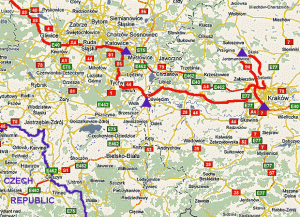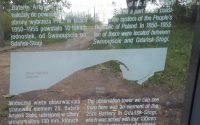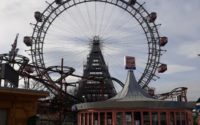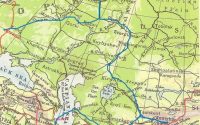Poland? It’s Full of Poles!
‘The Iron Curtain’, a notional wall that ran from the River Elbe in Germany to the Black Sea meant that from 1945 – 1989, there were two mutually distrustful Europes, both developing in diametrically opposite directions. Little news came from the other Europe especially in the 1950’s as Stalin’s USSR tightened its grip on East Germany, Poland, Czechoslovakia, Hungary, Bulgaria, Romania and Albania. Yugoslavia, although Communist, had rejected Stalinism and was neither part of the economic or political alliances of the Iron Curtain countries.
As a result people in the West only heard about satellite launches, defections or attempted revolutions in East Germany (1953), Poland (1955), Hungary (1956) and Czechoslovakia (1968). Red Army troops of the USSR were involved in suppressing all except for Poland. The leadership of the USSR recognised, that in Poland, it was more of a leadership change to get rid of an inept administration than an attempt to overturn the Communist system.
In that climate, my father got on with the job of helping raise a family, perhaps blotting from memory any thoughts about Poland. At primary school I was something of an oddity, as no one else in the school had a Polish father and whilst some teachers took sadistic delight in mispronouncing my surname, I was able to deal with other pupils who tried that on in the playground. It sometimes led to the headmaster’s office and a letter to my father, who threw it in the bin. At secondary school I was among many other pupils whose parent or parents were Polish, Lithuanian or Italian and so no one bothered.
The surname Pach has its origins in Germany and like many Poles before 1939, my father was bilingual from birth in both Polish and German, which was natural as he was of German descent too. I learned some Polish but mostly German from my father, who thought that would be more practical, which it was at the time. No one in their wildest dreams would have believed that the Berlin Wall would fall in 1989. My father did teach us Polish songs, and Polish and German Christmas Carols. I loved the ‘Song of the Vistula’, named after the river that runs the length of Poland all the way to the Baltic Sea https://youtu.be/qLp-OX370B4; the Polish Carol ‘Wśród Nocnej Ciszy’ (‘In the Silence of the Night’) https://youtu.be/tur9Vtn_QYE and the German carol ;’O Tannenbaum’ (O Christmas Tree) https://youtu.be/lS4wTuvR7Ik. Apart from that it was only minor stories of his boyhood, usually misbehaviour and that was it really until I visited Poland with Frank Baran in 1967 (see the post ‘1989’ published on 26th June 1989). I have no idea how much that got my father thinking again, but it certainly led to my mother encouraging him to try to get information from anywhere and, the best chance turned out to be ‘Internationaler Suchdienst’ based in Arolsen in what was West Germany. This was, and ,remains to the present day a tracing agency, which works alongside the Red Cross for missing persons world wide. Such an organisation would surely yield the results a lone enquirer could not. This proved to be the case (see the post ‘1989’ published on 26th June 1989) and the organisation wrote to my father to confirm where his mother had died and forwarded the name of a contact – Janina Oleksy – who lived in Krynica in southern Poland. Acting on the information from Suchdienst, he began correspondence with Madam Oleksy.
An unconnected event often stirs a person to act on a mere notion, and so it was in 1973, during the qualifying rounds for the 1974 Football World Cup Finals. Poland had been drawn in the same qualifying section as England. The press had hoodwinked the English footballing public into believing that qualification would be a mere formality, a warm-up for the finals. The same press forgot to add that Poland had won the Olympic gold medal for football in the 1972 Olympic Games in Munich. My father, until then only had a moderate interest in football but, on 6th June 1973, he sat down to watch live coverage of Poland v England from Chorzów, a city situated in Silesia with fanatical football supporters. My father was totally animated, and it felt like I was watching him actually playing as he stood up to clear every ball and score both goals in a 2-0 Poland victory! A shocked England began to take an interest in Poland. All of Scotland was, of course, cheering like mad! Four months later on 17th October in London, the score was 1-1 and to make matters worse for England, Poland scored first and held England at bay with a heroic defensive display, and of course, my armchair footballing father was the Man of the Match! England out of the World Cup! How dare these Poles! A World Cup can’t be a World Cup without England! On the plus side there were still many sane English voices who suggested that Poland would go on to shock a few people at the finals.
You can imagine how ecstatic my father was and, then he set off on a long story about Polish football teams before World War II, and rhymed off an array of his footballing heroes, none of which I had ever heard of, except for Ernst Wilimowski.
Back to 1974 and in the course of extensive correspondence he received two letters in succession from Madam Oleksy translated (some pieces were unreadable) as follows:
‘08/02/74
Dear Mr Pach
I received your letter and now I am writing to give you some information you asked for. The data you gave me seems all right to me. The only problem is the name. You wrote that your mum’s name is Joanna but it was Gryzelda Pachowa. When she lived in Krynica Mrs Pachowa left some photos and some documents and among them papers for her disability pension. I allowed myself to look through these papers and I found that Mrs Pachowa was born on 09/06/1899 in Vienna. There is also a picture of a boy on the back of it and the name is ‘Richard Brzesc 1936’. You gave me correct information. Mrs Pachowa lived in Legnica before she came to Krynica. She worked at the factory making pianos. Her position was artistic controller. She came to Krynica about 1958 and she was a music teacher. She left Krynica……………………………to find out about your mother from the people who knew her.
If you’d like to come to Poland you are welcome, just let me know when you are coming.
My regards
Janina Oleksy’……………………………………………………………………………………………………………………………………………………………………………………………………………………………………
19/04/74
Dear Mr Pach
Thank you for your letter. I am sorry that it took me so long to answer but I wanted to collect as much information on your mum as possible and it took me some time. I am not saying that you are not the son of Mrs Pachowa. Obviously she had two names Gryzelda and Joanna. The samples of her writing you sent me are the same. You write that your mother died in Krynica but it is not possible. It is a small place and I would have known about it. I heard that she died but I didn’t want to believe it because when she left Krynica she was full of life. I collected the information from every place possible and now I am sure she died. Sadly I must tell you that your mum died on 03/06/1960 in Żory. I will give you the information which is on the Death Certificate. She was born on 09/06/1899. At the time of her death she was a widow. The number of the Death Certificate is 45/1960 U.S.C in Żory, county Katowice, area Rybnik. It will be easy for you to find more information if you get her Death Certificate (Żory), the information will be on the card from the hospital, it will have the hospital’s stamp or the signature of the doctor who confirmed that she died. You can write to U.S.C in Żory or if you come to Poland you can go there and find out everything that happened. If you have problems with the travel agency, write to me and I will be happy to find a flat for you and your family in Krymica. Please let me know beforehand.
My best regards in anticipation of your answer.
Janina Oleksy’
Whether it was spur of the moment, or she had been building up to it, my mother asked my father if he had any notion of maybe going to Poland to follow up on the letters. After he asked her what did she think, she replied that if it was the other way round what would he say? And that was it, in summer 1974, after a sterling Polish effort in the 1974 World Cup Finals when they finished third, (my father played every minute of the Polish matches from the comfort of his armchair), my father accompanied by my mother and sister set off by car for Poland.
I remember my first trip to Poland in 1967. We left Glasgow on Friday evening on the sleeper to London and from there the train to Harwich, to board the ferry to Hoek van Holland. The ferry journey took 6 hours. From there we boarded the train en route to Warsaw which left at 8 o’clock or thereabouts on the Saturday evening, and on through Netherlands and West Germany before stopping dead once we crossed the border into East Germany. The station at Marienborn was peppered with Russian soldiers and East German border guards and then the compartments were flooded with East German customs officers from whom we had to buy transit visas and have our passports stamped. It was stamped again when we left East Germany and entered West Berlin, where we passed alongside the Berlin Wall and again when we crossed out of East Germany. We eventually arrived in Warsaw around 6 o’clock in the evening on the Sunday. Phew! In 1974 when the rest of the family drove, they would at least have the luxury of stopping for a wash or getting decent food whenever they wanted.
During the 6 weeks or so that they were in Poland, they visited Krynica and were made very welcome by Janina Oleksy and her family. My father was never one to display emotion, but in this instance my mother and sister allowed him some time to digest what he had been told and with the photographs of my grandmother which he had never seen. They were unable to go to Żory, mainly because there was no information to hand as to her place of burial. In those days in Poland bureaucracy was onerous in the extreme and there simply wasn’t enough time to wait. Instead, among other places they visited Kraków and they became the only people I knew, apart from Frank Baran, who had visited Auschwitz and the salt mines of Wieliczka near Kraków and on to the ski resort of Zakopane. My father was satisfied with the outcome of the visit and when I asked him about his impressions of Poland, his reply was …..’It’s full of Poles!’ . His explanation for this seemingly mad reply, was that it was not a country he recognised. Where were the Jewish people?…. the Ukrainians?….. the Belarussians?…..the Germans? I forgot he had grown up in a richly diverse country. The Poland that arose in 1945 was, intentionally or not, homogeneous.

They received a very kind letter from Janina Oleksy later that year.
06/10/74
My dear friends
I am really grateful to you for a nice letter and photo. I am very happy that you are pleased with your trip to Poland. It’s a pity we didn’t have the time to talk more but if you are planning to come to Poland on summer holiday you are more than welcome to come to Krynica. We have a nice area and you can see a lot. I would like to know if you had a safe trip back home and if your wife and Marysia liked Poland as it was their first time there. You have a very nice family. Your wife and Marysia are very nice people. It was a pity that they couldn’t speak Polish and we could not talk to each other. I hope that Marysia will learn a bit of Polish before the next summer holiday and she will be able to go with Gosia to the disco. Gosia is learning English but does not understand a lot and is afraid to speak because of her wrong accent. Gosia thanks you so much for the jeans that you will be sending to her.
My best regards to you and your wife and kisses to Marysia
Please write and tell us about your feelings about your trip.
Janina
Finishing in third place in that World Cup of 1974, put Poland on the map, however in 1978, the Roman Catholic Church elected the Archbishop of Kraków, Karol Wojtyla as Pope. This religious event had deep political implications for the whole of Eastern Europe, not just Poland.
End


